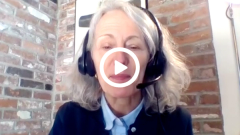
Unmet Needs in Treating RAI-Refractory Differentiated Thyroid Cancer
Lori J. Wirth, MD, discusses some of the unmet needs that exist in the thyroid cancer space following the FDA approval for lenvatinib for radioactive iodine-refractory differentiated thyroid cancer.
Episodes in this series

Lori J. Wirth, MD, associate professor of medicine at Harvard Medical School and medical director of the Center for Head and Neck Cancers at Massachusetts General Hospital, discusses some of the unmet needs that still exist in the thyroid cancer space following the FDA approval for lenvatinib (Lenvima) for radioactive iodine (RAI)-refractory differentiated thyroid cancer (DTC).
Transcription:
0:09 | There are a number of unmet needs for patients with iodine-refractory differentiated thyroid cancer. One of them, I think, is knowing when to best initiate therapy. We did take a look at this question from the data from the SELECT trial to try to tease out this really important question because of this toxicity profile of lenvatinib and the fact that differentiated thyroid cancer can grow relatively slowly, and patients can be asymptomatic from their disease for some time. There has been an interest in maybe holding off for as long as possible before starting lenvatinib to spare patients having to deal with the [adverse] effect profile of the drug.
1:05 | We did look at the data that are available from lenvatinib [in] the SELECT trial and did see that it does look like the progression-free survival [and] the objective response rates are better when the drug is started earlier in patients rather than when patients have a higher disease burden, or when they are more sick from their thyroid cancer. But still, it is challenging to know, when does the patient need to initiate therapy with lenvatinib vs continued disease monitoring and TSH suppression for some time.
1:48 | I think it is really important to kind of individualize that decision with the patient and talk with the patient about what the patient's goals are and what their considerations are. For patients who want to have the best treatment benefit, and perhaps survive as long as possible, there are some data that suggests that earlier initiation of lenvatinib does offer better efficacy, whereas those patients that really want to prioritize quality of life really do not want to have symptoms related to therapy, [so] delaying the initiation of therapy might make sense.






















